More than once, I’ve heard parents say that it’s silence, not noise, that makes them anxious about what their children might be up to. Moms and dads expect a certain ambient level of laughing, shouting, screaming, and fighting when the kids are in another room. If things suddenly go quiet, that’s when it’s time to worry.
Last fall, Americans chose once again to make the U.S. government captive to one highly unstable man’s childish psychodrama. If that overgrown child suffers a major setback, as he did on Wednesday when the U.S. Court of International Trade declared his “Liberation Day” tariffs unlawful, we expect shouts, tantrums, and threats. But as I write this on Thursday, he hasn’t uttered a peep. Why not?
It’s unnerving. If things suddenly go quiet, that’s when it’s time to worry.
Or is it? As news of the ruling circulated on social media last night, optimists noted that Donald Trump and his team had been handed an ideal pretext to wind down the idiotic global trade war they declared last month. Like Vladimir Putin in Ukraine, they can’t voluntarily withdraw from a conflict they started without losing face; what they needed was a way to withdraw that they could pretend was involuntary. Now, thanks to the court, they had one. The damned judges killed our protectionist agenda before we could implement full juche.
“The courts striking down the tariffs is the best political off-ramp Trump could ask for, will play into his politics perfectly while saving him from his own policy,” former Congressional Research Service staffer Matt Glassman observed. Maybe the White House was thinking along the same lines after the ruling, and that’s why the president resorted to uncharacteristic silence. He was privately relieved, perhaps, at having been rescued from his own mistake and can now focus on one of his favorite populist pastimes, demagoguing the judiciary.
I’m skeptical, though. And not just because the White House allowed the Justice Department to seek an immediate stay of the ruling.
Glassman’s argument makes sense in a world in which politics is driven by logic and no sense at all in a world in which it’s driven by one man’s psychodrama. For the White House, I think it’s this simple: If Donald Trump is prepared to yield to federal judges on his most cherished policy priorities, especially the very stupid ones, what is the point of Trump 2.0? What is the point of postliberalism writ large?
Many lanes.
The first thing to understand about the off-ramp that the Court of International Trade supposedly offered him yesterday is that it’s not actually an off-ramp.
It’s a potential off-ramp with respect to a specific tariff authority that was granted to the president by Congress years ago, the International Emergency Economic Powers Act of 1977. There’s no “emergency” that justifies slapping new taxes on every country in the world simultaneously, the three-judge panel (one member of which was appointed by Trump himself) ruled, reasonably enough. Trump exceeded the power delegated to him under that statute—but only that statute.
He has many others to fall back on. For instance, Section 232 of the Trade Expansion Act of 1962 authorizes the president to tariff certain sectors, like steel, in the name of protecting national security. Trump has already imposed levies under that section and Wednesday’s court ruling left them untouched.
Other laws offer broader authority. Section 122 of the Trade Act of 1974 permits the president to impose 15 percent tariffs for up to 150 days; Section 301 of the same act permits additional tariffs with no cap or time limit, although it does require the administration to conduct lengthy investigations into whether the targeted country is restricting U.S. commerce in “unjustifiable” ways. Trump based his “Liberation Day” tariffs on IEEPA because that law came with no procedural strings attached, but nothing’s stopping him from switching to Sections 122 and/or 301 to keep the “liberation” going.
There’s yet another statute, one that’s never been used, that sounds right up his alley. Section 338 of the Tariff Act of 1930 authorizes levies of up to 50 percent on countries that the president deems to have “discriminated” against American goods in their trade practices. There are no procedural restrictions. Since Trump seems to regard the mere fact of running a trade surplus with the United States as “discriminatory,” he may well shift to Section 338 going forward. And markets are worried about it.
Even if Trump insists on taking the off-ramp with respect to IEEPA, then, how would he justify to his protectionist fans also taking the off-ramp on each of the other four statutes I’ve described? They’ll demand to know why he didn’t simply switch legal “lanes”—you know, like Joe Biden did—and continue on to his destination. What will he say?
A ‘judicial coup.’
A second problem for Trump with taking the off-ramp is that the politics of doing so are no longer as “perfect” for him as they would have been during his first term.
Trump 1.0 was all about him submitting to institutional restraints on his power while fuming incessantly about his own impotence. The Russiagate probe was the supreme example. The president whined about it ad nauseam, but cooler heads prevailed in convincing him not to obstruct the investigation by firing Robert Mueller or ordering prosecutors to suspend their work.
Trump 2.0 is supposed to be different, the strongman unleashed at last. Institutions that resist him won’t merely be vilified this time, they’ll be forced to submit or be broken. In keeping with that, he’s spent months delegitimizing the judiciary in unsubtle ways to prepare his supporters for when he inevitably defies a Supreme Court ruling that meaningfully limits his power. Having convinced some unknown but doubtless sizable percentage of them that judicial authority over the executive is illegitimate per se, how does he turn around now and submit meekly to a lower-court ruling that snatched away one of his most prized policy possessions?
Is he a “fighter” or isn’t he?
If Trump 2.0 wanted an off-ramp from tariffs, Stephen Miller wouldn’t have spent the hours following Wednesday’s ruling tweeting about a “judicial coup” and “judicial tyranny.” One of the most blatantly fascist members of the president’s inner circle, Miller is the personification of his boss’s political id, the sort of character who’s forever searching for national emergencies to justify authoritarian power grabs. Seeing the IEEPA tariffs struck down is a direct threat to that: Once the courts start naysaying phony emergencies, the entire postliberal project is at risk.
So Miller took to wheezing about a “coup,” an Orwellian inversion of the executive overreach that Wednesday’s ruling sought to undo. Until Trump, IEEPA had only been used to justify trade sanctions and embargoes, never tariffs, and no president had strained the statute’s concept of an “emergency” to the breaking point by applying it to every country on earth. All the Court of International Trade did was find that the Constitution means what it says: The power to tax belongs to Congress, not to the president, and if Congress intends to lend that power to the White House to start global trade wars, it needs to be much clearer in saying so.
The most one can say on the merits for Miller’s position is that courts traditionally have given the president wide leeway to use IEEPA. Cracking down now is a break with that tradition. But so what? Courts break with tradition all the time. Republicans rejoiced 30 years ago when the Rehnquist court broke with decades of SCOTUS precedent by putting an end to Congress’s abuse of the commerce clause to justify all manner of non-commercial federal legislation. Go figure that the current judiciary might take a fresh look at its own traditions of deferring to the executive branch when faced with a president who plainly wants to be king, operates in bad faith in court, and is no longer being checked by a pitiful, prostrate Congress.
To MAGA, though, none of that will matter. Miller called the tune with his “coup” claptrap, and populists will dance to it. Which means not only can’t the president afford to treat yesterday’s ruling as an off-ramp—to do so would mean submitting to a “tyranny”—but he’ll come under intense pressure from the right not to yield even if the Supreme Court upholds the ruling on the appeal.
“The chances that Trump eventually gives the middle finger to Article III just went up dramatically, because this is something he actually cares about,” political analyst Sean Trende warned after the court’s decision. That’s correct. The politics of Trump 2.0 simply aren’t the same as the politics of Trump 1.0. It’s more likely this time that the president speeds up and aims his vehicle at the courts than that he takes an off-ramp.
Psychodrama.
Laying all that aside, why would we assume that Trump even wants to be saved from his own policy in this case? Where’s the evidence that he’s given up on tariffs and is seeking an exit that will deliver him back to the economic status quo ante?
It was less than a week ago that he “recommended” a new 50 percent tariff on the European Union (which he soon paused, of course) and threatened a tariff of “at least 25 percent” on foreign-made iPhones. His trade deal with China earlier this month didn’t eliminate tariffs on Chinese goods; it merely reduced them to a 30 percent rate—still an enormous hardship for American businesses.
He just likes tariffs. He’s spent his whole adult life liking them. He believes, and I quote, that “trade is bad.” And not unreasonably, he seems convinced that he has a political mandate to act on that view. When asked last month what he’d say to voters who claim that they didn’t “sign up for” higher prices on foreign goods, Trump replied, "Well, they did sign up for it, actually. And this is what I campaigned on.”
He campaigned on it and he won. He’s staked his political credibility on protectionism. Why would he take an off-ramp now, less than 10 percent of the way through his journey to January 2029?
The sense I get from him is that the 90-day pause he ordered after “Liberation Day” really is a pause, a cooling-off period during which he’s expecting investors to calm down, recoup their initial losses, and reconcile themselves to the new normal of more expensive imports. He won’t return to the exorbitantly high tariff rates of April 2 once the pause ends, in all likelihood, but there’s no reason to believe he’s prepared to abandon his presidential authority over tariffs altogether in response to Wednesday’s court ruling.
On the contrary, there are plenty of intangible reasons to think he won’t. Our pal Andrew Egger ticked through a few today at The Bulwark:
There’s his deep love of being the guy on the throne, to whom all other leaders—representatives of other nations and great businesses alike—must come and supplicate themselves. And there’s his inflated self-image as a master negotiator: Trump believes that he’s guaranteed to come out the winner of any deal, so anything that brings others to the negotiating table is inherently good strategy.
More than anything else, Trump craves dominance—and not merely to dominate, but to be seen by others as dominating all around him. Any narrative of the trade war that doesn’t cast him as the Great Man Astride the World is abhorrent to him.
To illustrate, Egger rightly points to what happened yesterday at the White House when a reporter asked the president about the acronym that’s now being used in finance circles to describe his many reversals on trade policy: “TACO,” short for “Trump Always Chickens Out.” There’s no insult more grievous to a strongman than calling him a wimp, and Trump didn’t pretend otherwise. “Don’t ever say what you said,” he told the reporter. “That’s a nasty question. To me, that’s the nastiest question.”
Given a choice between relinquishing his tariff power for the long-term good of the U.S. economy and doubling down on economy-crushing levies to prove the “TACO” wiseguys wrong, there isn’t a shadow of a doubt which he’s more likely to do. You can’t understand American politics if you don’t understand Donald Trump’s psychodrama, and that psychodrama provides a clear answer about whether he’ll take the off-ramp available to him or not.
What’s next.
Let’s end with a few predictions.
One: The president will fight tooth and nail in court to defend his IEEPA authority but will switch to other statutes to justify his tariff powers in the meantime, forcing foreign governments to continue to petition him for “deals.” If those deals don’t happen (and there sure haven’t been many so far), he’ll blame yesterday’s court ruling for undermining his authority to negotiate on behalf of the United States. And not without reason: America’s trade partners are bound to feel less pressured by the tariffs he’s imposed now that they’re under a legal cloud.
Two: Yesterday’s court ruling will boost public support for the judiciary in standing up to Trump. A national poll conducted earlier this month found 63 percent of Americans disapprove of the president’s handling of tariffs; another conducted in February and March saw 52 percent (including 56 percent of independents) agree when asked if he’s a “dangerous dictator whose power should be limited before he destroys American democracy.” The courts are the only thing standing between consumers and businesses on the one hand and destructive, imperious, probably unlawful executive stupidity on trade on the other, and increasingly, everyone knows it. That will shore up respect for Article III when Article II directly challenges its authority.
Three: The Supreme Court will uphold the Court of International Trade’s decision on IEEPA. Granted, we shouldn’t expect too much of a 6-3 conservative majority that’s being asked to break with precedent by denying a Republican the traditional deference the executive enjoys on trade. But remember that the Roberts court has been keen to establish in recent years that Congress can’t delegate its authority to the president over “major questions” of public policy unless it “speaks clearly” to that end. Using IEEPA to start a global trade war is pretty darned “major,” and the fact that the statute, er, doesn’t mention tariffs presents an obvious clarity problem.
There may be another reason to bet against Trump when SCOTUS rules on this, though. In an opinion last week upholding the president’s power to fire the heads of certain federal agencies, the conservative majority went out of its way in a footnote to say that its ruling does not apply to the Federal Reserve. Justice Elena Kagan laughed at that in dissent, arguing that the majority’s reasoning logically applies just as much to the Fed as to other agencies; the only reason to create a “bespoke” exception for it, she implied, was to “reassure the markets.” If it’s true that SCOTUS is reluctant to side with Trump when doing so might foreseeably trigger a market meltdown, reinstating his power under IEEPA to blow up global trade will be unappetizing.
Fourth and finally: Trump will ask House and Senate Republicans to add some new statutory authority for presidential tariffs to the One Big Beautiful Bill that’s being negotiated in Congress.
To say that he’ll ask is not to say that they’ll agree, as there’s enough vestigial conservatism left in the legislature that even a dependable crony like Ted Cruz has complained lately about Trump’s trade war. But power over tariffs is important to the president, and a new grant of that power by Congress would shore up his legal case before the courts, as his lawyers are doubtless advising him today.
There’s a potential procedural problem—namely, that in order to pass by simple majority in the Senate under the reconciliation process, any tariff amendment would need to comply with the so-called “Byrd rule” that limits reconciliation to budgetary measures that reduce the deficit. But Trump’s tariffs do that (at least if you ignore the impact they’re likely to have on economic growth): By one estimate, they’ll raise $150 billion per year, supplying some much-needed cash to the government to offset the revenue that’ll be lost by extending the Trump tax cuts.
It would be ironic if Wednesday’s ruling rejecting a Trump power grab motivated slavish Republican toadies in Congress to hand over even more of their power on trade to him, but that outcome is certainly more likely than the White House forfeiting its tariff authority altogether. There’s no off-ramp. In the second Trump administration, the car will need to hit something and end up in a ditch before it stops.
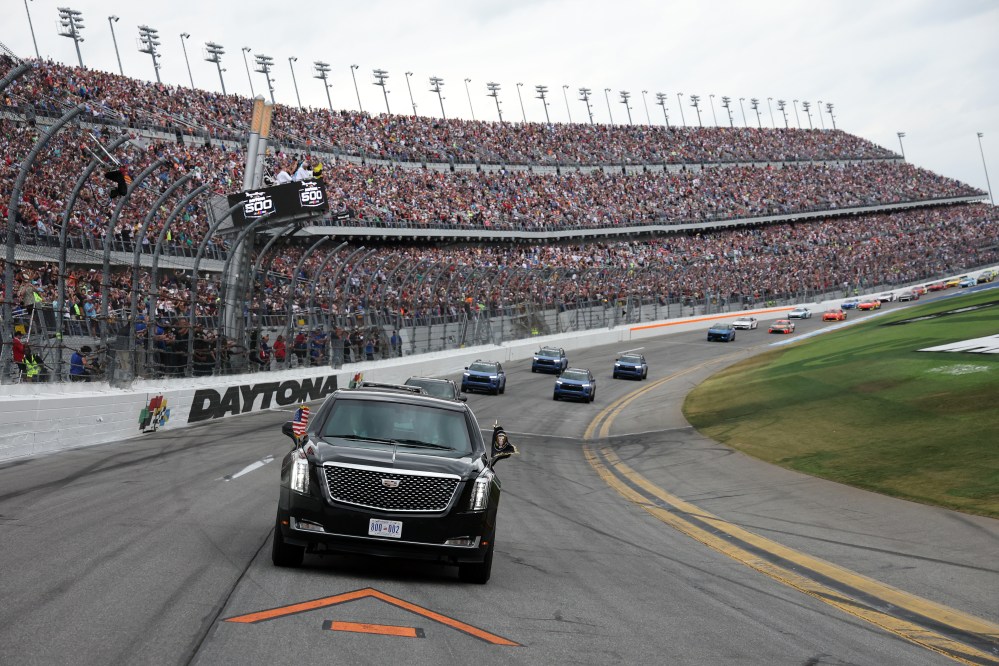

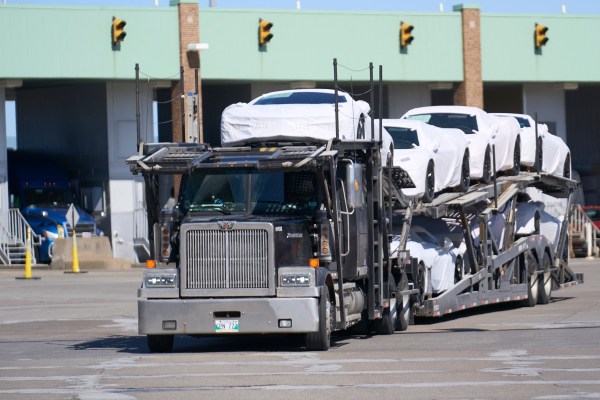
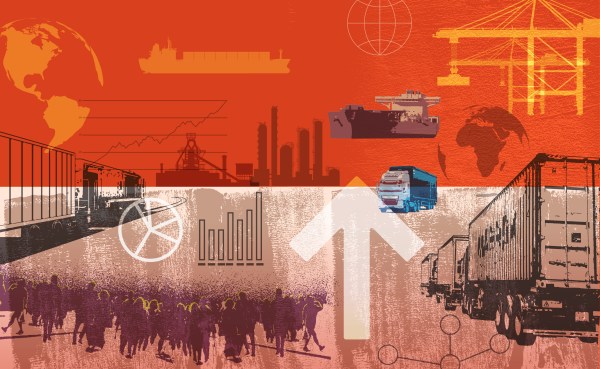
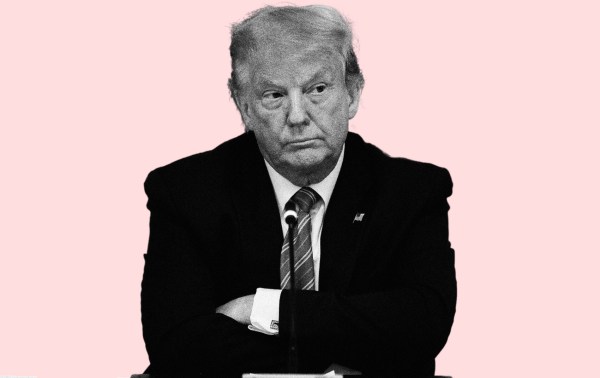

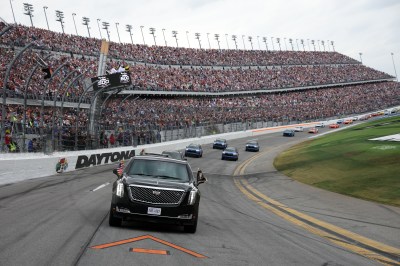
Please note that we at The Dispatch hold ourselves, our work, and our commenters to a higher standard than other places on the internet. We welcome comments that foster genuine debate or discussion—including comments critical of us or our work—but responses that include ad hominem attacks on fellow Dispatch members or are intended to stoke fear and anger may be moderated.
With your membership, you only have the ability to comment on The Morning Dispatch articles. Consider upgrading to join the conversation everywhere.